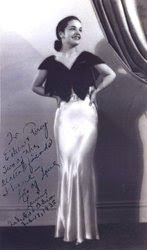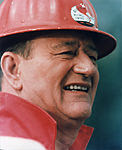
Despite decades spent playing sober commanders and serious captains, Leslie Nielsen insisted that he was always made for comedy. He proved it in his career's second act.
"Surely you can't be serious," an airline passenger says to Nielsen in "Airplane!" the 1980 hit that turned the actor from dramatic leading man to comic star.
"I am serious," Nielsen replies. "And don't call me Shirley."
The line was probably his most famous — and a perfect distillation of his career.
Nielsen, the dramatic lead in "Forbidden Planet" and "The Poseidon Adventure" and the bumbling detective Frank Drebin in "The Naked Gun" comedies, died on Sunday in Fort Lauderdale, Fla. He was 84.
The Canada native died from complications from pneumonia at a hospital near his home, surrounded by his wife, Barbaree, and friends, his agent John S. Kelly said in a statement.
Critics argued that when Nielsen went into comedy he was being cast against type, but Nielsen disagreed, saying comedy was what he intended to do all along.
"I've finally found my home — as Lt. Frank Drebin," he told The Associated Press in a 1988 interview.
Comic actor Russell Brand took to Twitter to pay tribute to Nielsen, playing off his famous line: "RIP Leslie Nielsen. Shirley, he will be missed."
Nielsen came to Hollywood in the mid-1950s after performing in 150 live television dramas in New York. With a craggily handsome face, blond hair and 6-foot-2 height, he seemed ideal for a movie leading man.
Nielsen first performed as the king of France in the Paramount operetta "The Vagabond King" with Kathryn Grayson.
The film — he called it "The Vagabond Turkey" — flopped, but MGM signed him to a seven-year contract.
His first film for that studio was auspicious — as the space ship commander in the science fiction classic "Forbidden Planet." He found his best dramatic role as the captain of an overturned ocean liner in the 1972 disaster movie, "The Poseidon Adventure."
Behind the camera, the serious actor was a well-known prankster. That was an aspect of his personality never exploited, however, until "Airplane!" was released in 1980 and became a huge hit.
As the doctor aboard a plane in which the pilots, and some of the passengers, become violently ill, Nielsen says they must get to a hospital right away.
"A hospital? What is it?" a flight attendant asks, inquiring about the illness.
"It's a big building with patients, but that's not important right now," Nielsen deadpans.
It was the beginning of a whole new career in comedy. Nielsen would go on to appear in such comedies as "Repossessed" — a takeoff on "The Exorcist" — and "Mr. Magoo," in which he played the title role of the good-natured bumbler.
But it took years before he got there.
He played Debbie Reynolds' sweetheart in 1957's popular "Tammy and the Bachelor," and he became well known to baby boomers for his role as the Revolutionary War fighter Francis Marion in the Disney TV adventure series "The Swamp Fox."
He asked to be released from his contract at MGM, and as a freelancer, he appeared in a series of undistinguished movies.
"I played a lot of leaders, autocratic sorts; perhaps it was my Canadian accent," he said.
Meanwhile, he remained active in television in guest roles. He also starred in his own series, "The New Breed," "The Protectors" and "Bracken's World," but all were short-lived.
Then "Airplane!" captivated audiences and changed everything.
Producers-directors-writers Jim Abrahams, David and Jerry Zucker had hired Robert Stack, Peter Graves, Lloyd Bridges and Nielsen to spoof their heroic TV images in a satire of flight-in-jeopardy movies.
After the movie's success, the filmmaking trio cast their newfound comic star as Detective Drebin in a TV series, "Police Squad," which trashed the cliches of "Dragnet" and other cop shows. Despite good reviews, ABC quickly canceled it. Only six episodes were made.
"It didn't belong on TV," Nielsen later said. "It had the kind of humor you had to pay attention to."
The Zuckers and Abraham converted the series into a feature film, "The Naked Gun," with George Kennedy, O.J. Simpson and Priscilla Presley as Nielsen's co-stars. Its huge success led to sequels "The Naked Gun 2 1/2" and "The Naked Gun 33 1/3."
His later movies included "All I Want for Christmas," "Dracula: Dead and Loving It" and "Spy Hard."
Between films he often turned serious, touring with his one-man show on the life of the great defense lawyer, Clarence Darrow.
Nielsen was born Feb. 11, 1926 in Regina, Saskatchewan.
He grew up 200 miles south of the Arctic Circle at Fort Norman, where his father was an officer of the Royal Canadian Mounted Police.
The parents had three sons, and Nielsen once recalled, "There were 15 people in the village, including five of us. If my father arrested somebody in the winter, he'd have to wait until the thaw to turn him in."
The elder Nielsen was a troubled man who beat his wife and sons, and Leslie longed to escape. As soon as he graduated from high school at 17, he joined the Royal Canadian Air Force, even though he was legally deaf (he wore hearing aids most of his life.)
After the war, Nielsen worked as a disc jockey at a Calgary radio station, then studied at a Toronto radio school operated by Lorne Greene, who would go on to star on the hit TV series "Bonanza." A scholarship to the Neighborhood Playhouse brought him to New York, where he immersed himself in live television...














